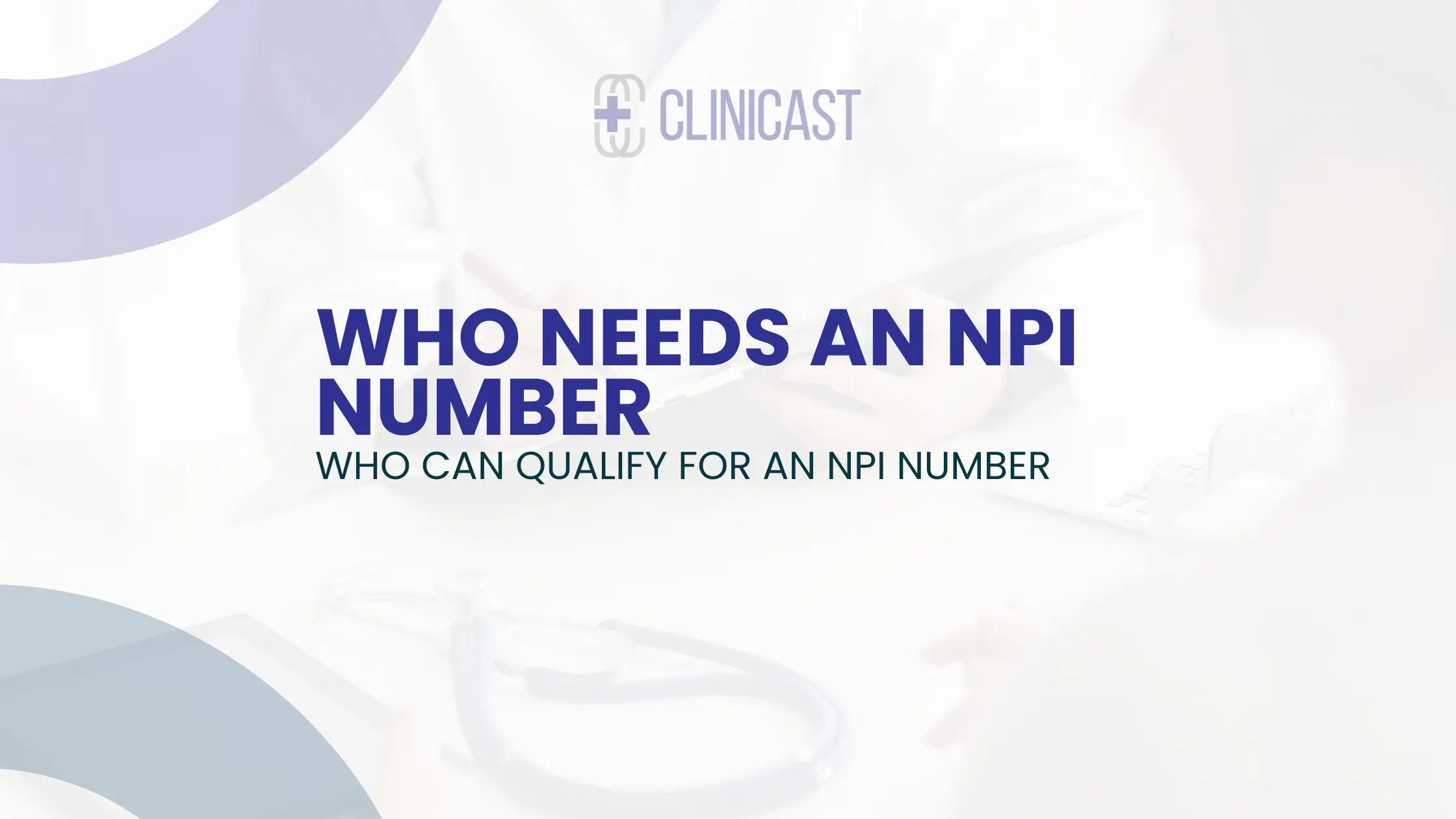When it comes to becoming a healthcare provider, a lot of things are needed that need to be taken care of including compliance with the HIPAA standards, insurance credentialing, CMS standards, and most of all, obtaining an NPI number. All these steps are mandatory and essential to having a completely smooth reimbursement process but that can’t be possible without having an NPI number.
This might explain why healthcare providers should have NPI numbers but who needs an NPI number other than providers? Are there other entities that need it? NPI – National Provider Identifier is a number that consists of 10 digits and represents the identity of a provider of healthcare whether a hospital or a physician. This NPI number is further used by insurance providers, third-party entities and payers, and healthcare plan providers for the process of medical reimbursement.
In order to get an NPI number, there are certain obligations that a provider needs to meet at a certain point when they are about to start providing their services. This includes academic medical procedure credentials and going through a trainer test and clearing it. However, regardless of the doctor program or the certification that you have already could not qualify you for getting an NPI number other than these requirements. Professionals not having NPI numbers face a range of significant circumstances when it comes to the medical billing process.
Keep reading to know more about NPI numbers and the information surrounding them.
Introduction to NPI – Who needs an NPI number?
As said, the NPI number is a numeric code that is vital to identify a provider given by HIPAA as an Administrative Simplification Standard. These numbers do not contain any personal information of a provider thus, not required any personal credentials. In addition, according to HIPAA standards, every provider must provide their NPI numbers whenever they require an administrative or financial transaction.
To get insurance, a provider needs to hold a professional medical certification to get eligible for treating patients and get approved to perform medical tasks. With this insurance process, providers would be getting paid for their services rendered, which is why getting in-network insurance eligibility is also important for receiving payments.
Professionals and credentialed professional physicians are more likely to provide health education and treatment to their patients. Also, they can assist in providing better health and make them aware of the possible consequences. In the long run, they build a strong yet versatile relationship with the patients as they have trained to put the health of the patients first.
All organizations and medical individuals who meet the healthcare definition specified in 45 CFR 160.103 who used healthcare medical records software like EHR for medical transactions and who work under HIPAA regulations must obtain NPI. These individuals and organizations include health plan clearing houses, health plans, physicians and healthcare providers, and individuals who are responsible to transfer data electronically, and those who have access to transmit health information. This means whether you are a healthcare provider, supplier of federally regulated programs, or physician covered by HIPAA must get an NPI. NPI is also mandatory for the providers when they wish to get enrolled in Medicare or Medicaid federally regulated health insurance services.
What is the worth of NPI?

What is the worth of NPI?
According to a general perception among nursing and medical staff, after completing the required degrees and getting an NPI, the process helped them assist better. As they have a standardized way of getting paid, it is even possible to help and assist patients who cannot and are not able to visit the hospital. NPI eventually guides them about methods of helping patients and provides a big picture so that they can educate affected patients about their diseases and ways to improve them constantly.
Types of NPI Providers
According to HIPAA privacy rules, there are specifically two types of NPI providers;
Type 1 NPI – Type 1 NPI holders are the ones who need NPI as a sole property like surgeons, physicians, dentists, and any other individual who claims to provide medical services. These individuals will fall under type one NPI.
Type 2 NPI – Type 2 NPI contains healthcare organizations and critical care facilities, physician groups, health systems, healthcare providers, assisted living facilities, and providers who are affiliated with different medical plans.
Here are some common questions that healthcare educators often asked about NPI numbers.
Can obtaining NPI numbers assist new grads to get on the list of professionals?
Medical students completing degree courses from NIWH (National Institute of Whole Health) successfully complete the degree program and develop motivation along with patient engagement.
Once they fulfill the required obligations of NPI, they become eligible to get acquainted with the professionals and collaborate with free-standing clinics. With NPI, it also becomes easy to receive payments for the services they provide.
Also, NPI numbers help even patients to cover either fully or partially according to their health insurance plans either public or private.
Can health educators and providers have an NPI?
Big deal!! If a provider or healthcare educator has all the required education and certification, they can apply for NPI and get reimbursed for the health education services. Besides, they can also apply for health education insurance services.
How is assistance from healthcare educators billed for reimbursement?
For healthcare educators, there are two ways to bill for the reimbursement of services. With the appropriate CPT codes and applicable guidelines, they can b bleed under the medical facility they have been working through nurse practitioners’ approach, medical practice, medical providers’ office, and physical practice. Similarly, employer flex spending plans and healthcare spending plans may assist in the case of private services provided by a healthcare educator having a National Insurance Identification number.
Does a Unique Physician Identification Number (UPIN) be replaced by a National Provider Identification (NPI)?
A healthcare identification number is provided by Medicare provided UPIN for medical practitioners and physicians in order to provide substitute identification of Social Security Number for the same physician and medical practitioners. Later in 2007, UPIN expired and the Centers for Medicaid and Medicare services introduced NPI ten-digit number identification as a provider identification number which essentially replaces UPIN. This decision was made to streamline the process as NPI numbers remain the same for a provider and are unchangeable throughout the service period of a provider regardless of the position and destination of a provider.
Does NPI also replace the Tax identification number – TIN?
Drug Enforcement Administration registration, Taxpayer identification number (TIN), Social Security number, or license number have no effect and would not be replaced by an NPI number. It does substantially act as a substitute for providers’ identification numbers who claim to provide healthcare services and want to receive reimbursement for the billed services as NPI refers to the unique ID provided by the government officers.
How can one identify an NPI number?
When it comes to identifying NPI numbers for verification of accreditation of a provider or an organization, there are multiple ways to do it. One of the free and easy ways to visit the NPPES NPI registry is the NPI lookup website which can be accessed to examine the identity of either a provider or an individual.
To start the verification, you just need to have an NPI number and the name of the provider. To search for the NPI number, filter the provider’s name with first and last name, select the NPI type from the ICON, and add a phone number and primary taxonomy. Here is some specific information about the credentials you will get as an NPI search result.
NPI – A set of ten digits provided by HIPAA for provider’s identification
Enumeration Date – It is the date when an NPI number was assigned to a provider
Status – The status reveals if the NPI is active or have deactivated due to a certain situation
NPI Type – NPI type depends on the providers either individual or organization
Address – contains the primary and secondary address of the facility or the organization associated with the NPI numbers
Taxonomy – It mainly clarifies what is the domain of the provider. It provides the opportunity for providers to select more than one NPI code but one must be primary.
Identifiers – With identifiers, it becomes easy for comparing Medicare and Medicaid providers to assist in recognizing health plans and providers.
Conclusion
Medical assistance either from hospitals, or providers and if it is covered is a pillar of a contented life. With the healthcare services provision, patients can be served at an expert level having complete knowledge of the specific industry. Once a provider is identified, it becomes easier to provide services and get listed in insurance plans and other healthcare facilities.


